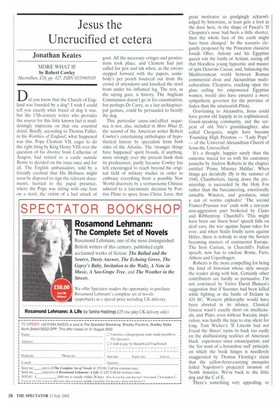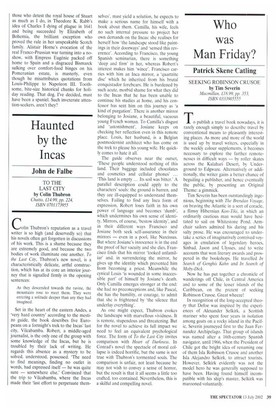Jesus the Uncrucified et cetera
Jonathan Keates
MORE WHAT IF by Robert Cowley
Macmillan, .£18, pp. 427, ISBN 0333905105
Did you know that the Church of England was founded by a dog? I wish I could tell you exactly what breed of dog it was, but the 17th-century writer who provides the source for this little known fact is maddeningly imprecise on that one essential detail. Briefly, according to Thomas Fuller, in his Worthies of England, what happened was this. Pope Clement VII, eager to do the right thing by King Henry VIII over the question of his divorce from Catherine of Aragon, had retired to a castle outside Rome to decided on the issue once and for all. The English ambassadors, told by a friendly cardinal that His Holiness might soon be disposed to sign the relevant documents, hurried to the papal presence, where the Pope was sitting with one foot on a stool, the victim of a bad attack of
gout. All the necessary cringes and prostralions took place, and Clement had just called for pen and ink when, as the envoys stepped forward with the papers, somebody's pet pooch bounced out from the crowd of attendants and knocked the stool from under his inflamed leg. The rest, as the saying goes, is history. The Anglican Communion doesn't go in for canonisation, but perhaps Dr Carey, as a last archiepiscopal gesture, could be persuaded to beatify the dog.
This particular cause-and-effect sequence is not, alas, included in More What If, the second of the American writer Robert Cowley's entertaining anthologies of hypothetical history by specialists from both sides of the Atlantic. The 'stranger things have happened' spirit broods, if anything, more strongly over the present book than its predecessor, partly because Cowley has felt encouraged to reach beyond his original field of military studies in order to embrace everything from a possible New World discovery by a venturesome Chinese admiral to a last-minute decision by Pontius Pilate to spare Jesus Christ. Love, that
great motivator so grudgingly acknowledged by historians, at least gets a foot in the door here, in the shape of Pascal's 'If Cleopatra's nose had been a little shorter, then the whole face of the earth might have been changed.' In the scenario elegantly proposed by the Princeton classicist Josiah Ober, Antony and his Egyptian queen win the battle of Actium, seeing off that bloodless young hypocrite and master of spin Octavius Caesar, and, balancing the Mediterranean world between Roman commercial clout and Alexandrian multiculturalism, Cleopatra, cracking open the glass ceiling for empowered Egyptian women, would also have ensured a more sympathetic governor for the province of Judea than the amateurish Pilate.
Gravitating to Alexandria, Jesus could have grown old happily in its sophisticated. Greek-speaking community, and the serpent of old Nile's granddaughter, also called Cleopatra, might have become 'Founding High Priestess — "Lady Pope" — of the Universal Alexandrian Church of Jesus the Uncrucified'.
It's a thought, happier surely than the outcome traced for us with his customary panache by Andrew Roberts in the chapter entitled 'Prime Minister Halifax'. When things get decidedly iffy in the summer of 1940, Chamberlain, laying down the premiership, is succeeded by the Holy Fox rather than the buccaneering, emotionally unstable Winston, and goodness, what a can of worms explodes! 'The second Franco-Prussian war' ends with a ten-year non-aggression pact brokered by Ciano and Ribbentrop. Churchill's 'This might have been our finest hour' speech falls on deaf ears, the war against Japan takes for ever, and when Stalin finally turns against Hitler, there is nobody to stop the Soviets becoming masters of continental Europe. The Iron Curtain, in Churchill's Fulton speech, now has to enclose Rome, Paris. Athens and Copenhagen.
Roberts is the more compelling for being the kind of historian whose style sweeps the reader along with him. Certainly other contributors are hardly so persuasive. I'm not convinced by Victor David Hansen's suggestion that if Socrates had been killed while fighting at the battle of Delium in 424 BC, Western philosophy would have been aborted in its infancy. Classical Greece wasn't exactly short on intellectuals, and Plato, even without Socratic inspiration, was hardly the type to stay silent for long. Tom Wicker's 'If Lincoln had not Freed the Slaves' turns its back too easily on the disillusioning realities of American black experience since emancipation; and the 'for want of a horseshoe nail' principle on which the book hinges is needlessly exaggerated by Thomas Fleming's claim that the yellow-fever-carrying mosquito foiled Napoleon's projected invasion of North America. We're back to the little dog and the C of E.
There's something very appealing, to those who detest the royal house of Stuart as much as I do, in Theodore K. Rabb's idea of Charles I dying of plague in 1641 and being succeeded by Elizabeth of Bohemia, the brilliant exception who proved the rule in her unspeakable Scotch family. Alistair Home's evocation of the real Franco-Prussian war turning into a noshow, with Empress Eugenie packed off home to Spain and a disgraced Bismarck sulking over comfort-food binges on his Pomeranian estate, is masterly, even though he misattributes quotations from Louis-Philippe to Napoleon III. Toothsome, bite-size historical chunks for holiday reading. That dog, I've decided, must have been a spaniel. Such inveterate attention-seekers, aren't they?



































































 Previous page
Previous page